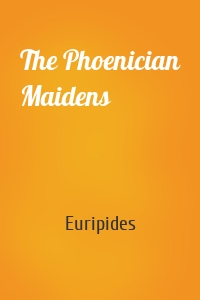Euripides
56 кн.
The Suppliants
Though little is known for certain of his early life, Euripides was probably born around 460 b.c.e. to the farmer Mnesarchus and his wife Clito, and his studious nature quickly led him to a literary life in Athens. His work sticks out from that of his contemporaries for his attention to the political and social problems around him, although he never held public office. His plays are often ironic, pessimistic, and display radical rejection of classical decorum and rules. «The Suppliants» is one...
| Автор | Euripides |
Electra and Other Plays
In «Electra and Other Plays» we have a collection of five of the classical dramatist Euripides' best plays. In the title work «Electra», before the events of this play, the Greek general Agamemnon sacrificed a daughter to appease the gods and gain permission to sail for Troy. His wife Clytemnestra never forgave him, and upon his return she and her lover murder him. Euripides picks up the story with the children of Agamemnon and Clytemnestra, the young Electra, who has been sent to live on a...
| Автор | Euripides |
The Cyclops
Euripides (480 BC-406 BC) is revered as one of the three great tragedians of classical Athens, along with Aeschylus and Sophocles, and produced the largest body of extant work by any ancient playwright. He is considered to be the most modern of the three, and he laid the foundation for Western theatre. His works are characterized by their moral ambiguity, plots of intrigue, and a separate character (usually a deity) who introduces the play with an explanatory prologue. «The Cyclops» dramatizes...
| Автор | Euripides |
Heracles
Euripides (480 BC-406 BC) is revered as one of the three great tragedians of classical Athens, along with Aeschylus and Sophocles, and produced the largest body of extant work by any ancient playwright. These three provided the canon of Greek tragedy and thereby lay the foundation of Western theatre. Euripides' works are characterized by their moral ambiguity, plots of intrigue, and a separate character (usually a deity) who introduces the play with an explanatory prologue. «Heracles» was...
| Автор | Euripides |
The Phoenician Maidens
Euripides turned to playwriting at a young age, achieving his first victory in the dramatic competitions of the Athenian City Dionysia in 441 b.c.e. He would be awarded this honor three more times in his life, and once more posthumously. His plays are often ironic, pessimistic, and display radical rejection of classical decorum and rules. Together with Aeschylus and Sophocles, Euripides would provide the canon of Greek tragedy and thereby lay the foundation of Western theatre. «The Phoenician...
| Автор | Euripides |
Medea (Translated with an Introduct...
The influence of Euripides on the development of the dramatic genre cannot be overstated. Along with Sophocles and Aeschylus he is regarded as one of the three great Greek tragedians from classical antiquity. One of the most important of Euripides’ surviving dramas is “Medea”, the story of its title character, the wife of Jason of the Argonauts, who seeks revenge upon her unfaithful husband when he abandons her for a another bride. Set in Corinth sometime after Jason’s quest for the Golden...
| Автор | Euripides |
Book of illustrations
"Book of illustrations" by Euripides, Sophocles, Aeschylus, Richard G. Moulton. Published by Good Press. Good Press publishes a wide range of titles that encompasses every genre. From well-known classics & literary fiction and non-fiction to forgotten−or yet undiscovered gems−of world literature, we issue the books that need to be read. Each Good Press edition has been meticulously edited and formatted to boost readability for all e-readers and devices. Our goal is to produce eBooks...
| Автор | Euripides |
Ten Plays
Of Euripides’ roughly ninety-two plays, only seventeen tragedies survive. Both ridiculed and lauded during his life, Euripides now stands as one of the greatest innovators of Greek drama. Collected here are ten of Euripides’ most important tragedies in prose translation by Edward P. Coleridge. In the first play in this collection, “The Alcestis”, Euripides expands upon the myth of Princess Alcestis at the time of her death. “Medea”, tells the horrific tale of a woman who seeks revenge on her...
| Автор | Euripides |









